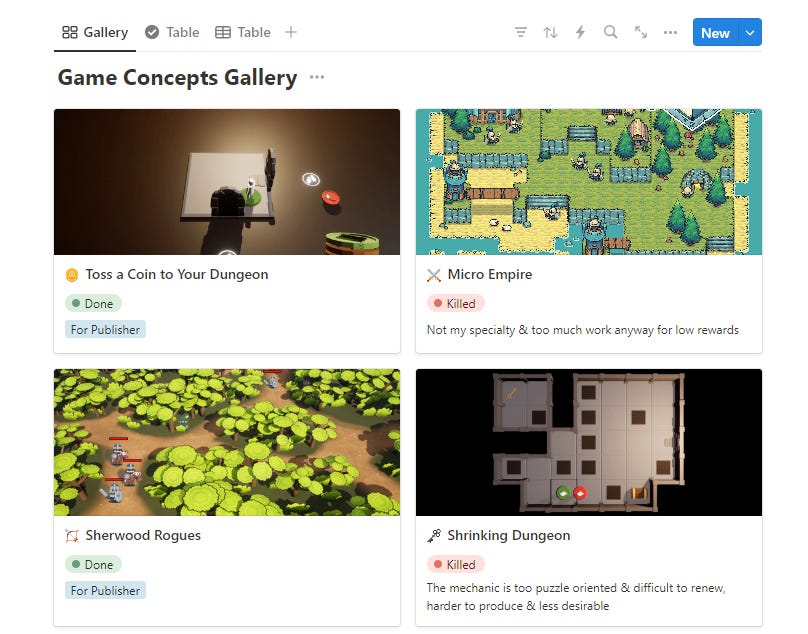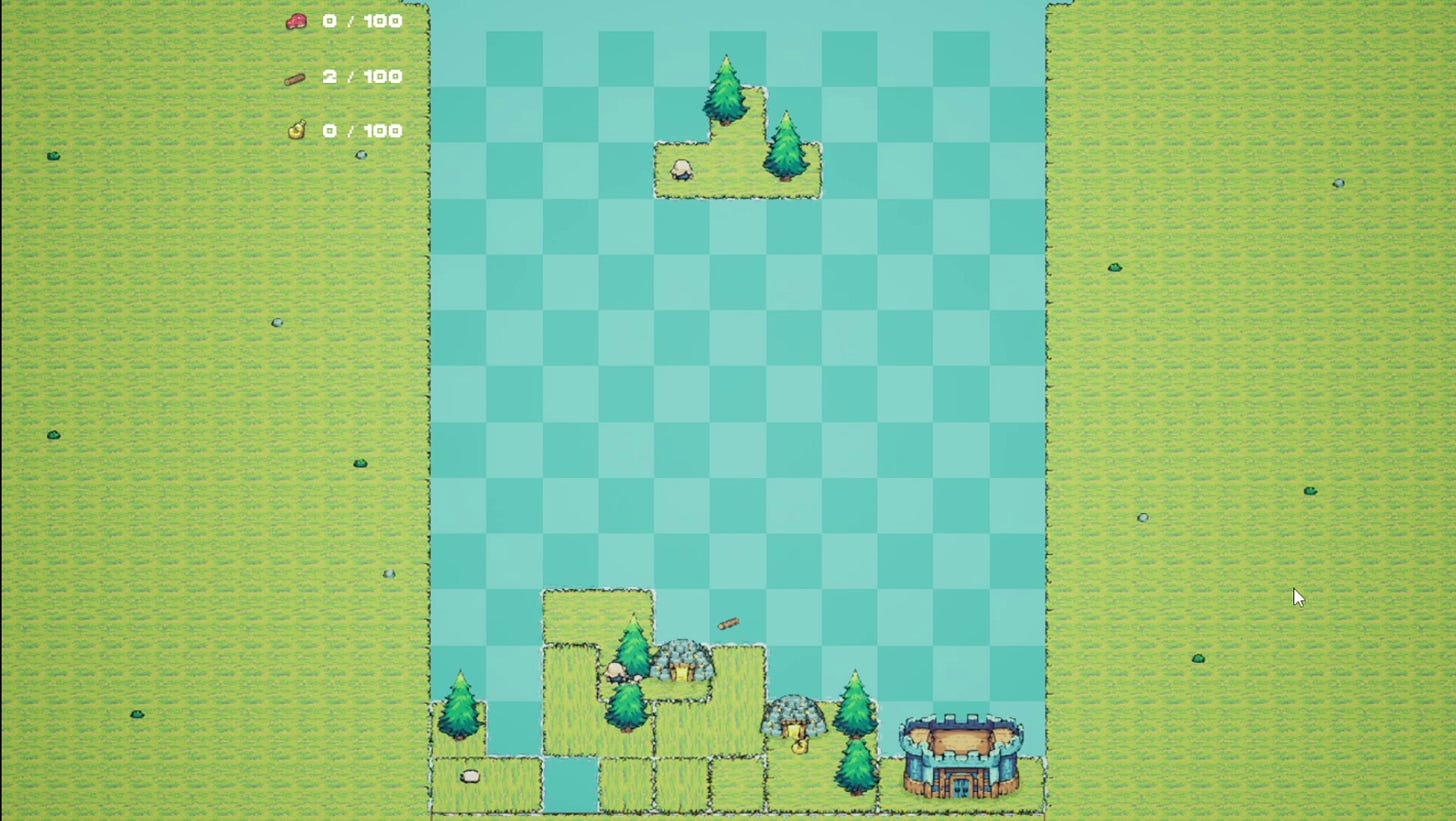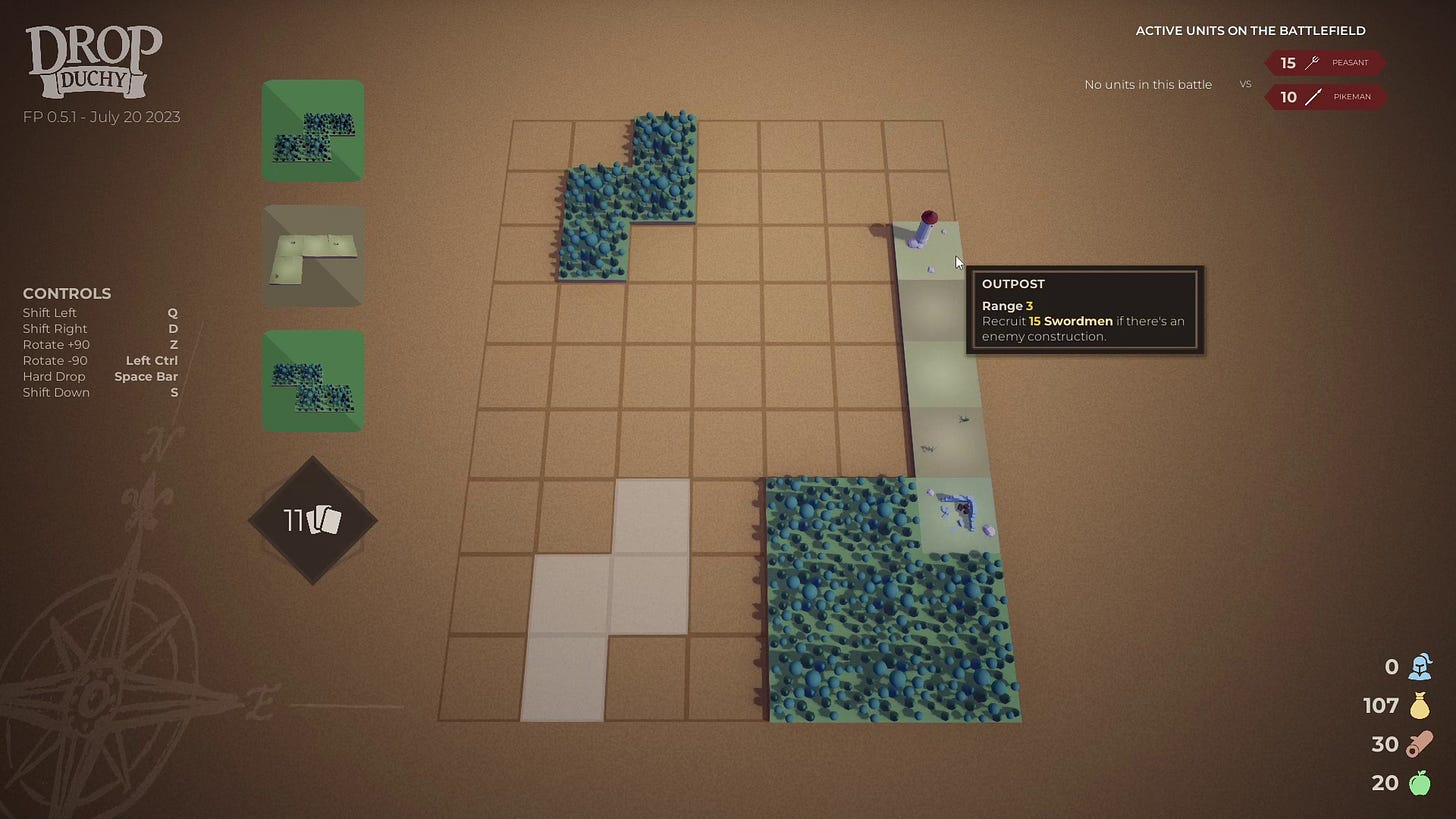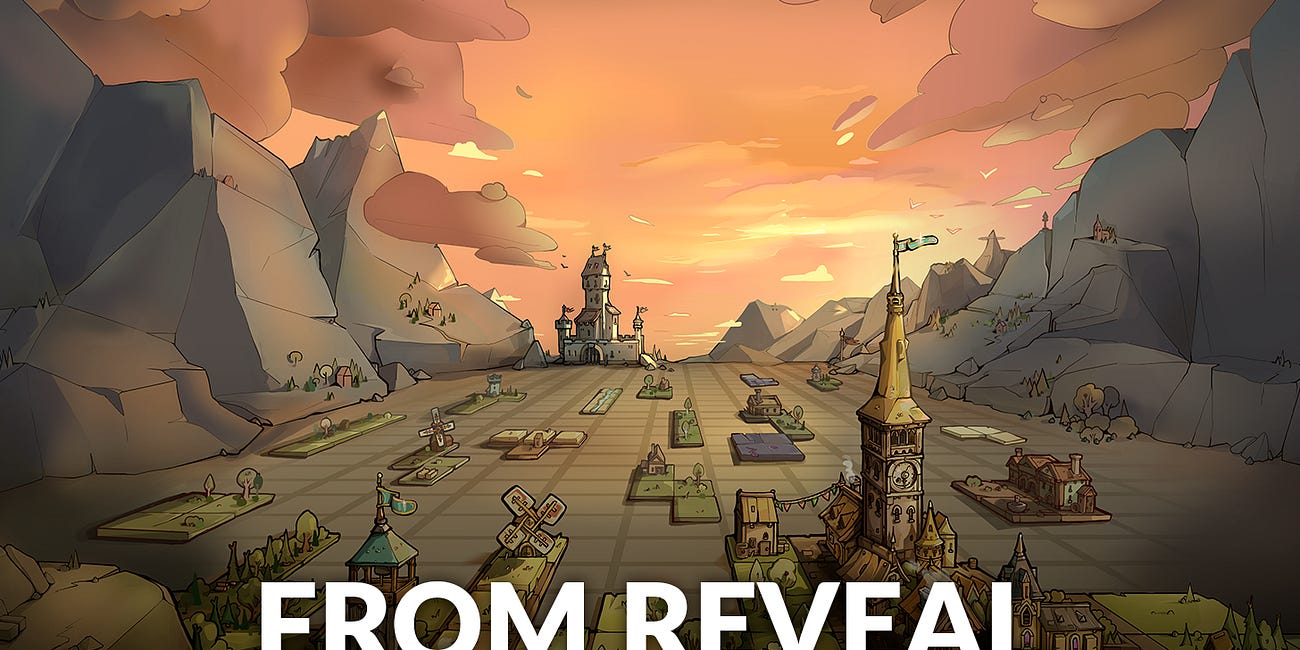How I Started An Indie Studio
My first game Drop Duchy is now announced, let me tell you how I got there.
Fi-na-lly!
Finally, I can talk to you about the game I've been working on for the last year and a half: Drop Duchy, a hybrid roguelite mixing various recognizable influences into an original formula (trailer here). It has just been announced, and I couldn't talk about it earlier because I had agreed with my publisher to keep it secret until then, but damn, it was hard!
More importantly, let me introduce you to Sleepy Mill Studio, the company I founded and the spotlight of today's article. In the following story, you'll, of course, learn about Drop Duchy's production since it's the studio's first (and so far, only) game, but consider this piece as the “making-of.”
Rest assured, however, that the “developer commentary” will come as well: I'll regularly share more details about the game and the design choices I made in the studio newsletter (subscribe there if you'd like to read about that). So, without further ado, let's dig into Sleepy Mill Studio's ambitious objectives, creeping doubts, and surprising victories of its debut.
End of 2022: The Spark
The story begins in September 2022 when I'm about to leave my Game Director position on the Little Big Adventure Remake, and I wonder what I should do next. Taking another Lead Design position was a viable option, but another idea floated in my mind: what if I tried to launch my own indie studio, too? I'd undoubtedly face new challenges going down this route, yet the opportunity to design my ideal job and challenge myself seemed appealing.
I wanted to take my time to make a decision before diving headfirst into the entrepreneur's life, so my first decision was to study the waters carefully—first things first: the money. In France, we have access to unemployment benefits, and the government is more than happy if you use the monthly allowance to survive while launching a business. Of course, this represents a fraction of my previous salary, but combined with my partner's support and my personal savings, it would only reduce my lifestyle a little (buying second-hand is excellent for the planet anyway).
During the first months, I met people, completed training in video game marketing, and read about the industry's business side. Even if I knew a lot about designing and delivering a game, I would need more than my AAA experience in a massive company to understand how to emerge and survive as a new indie in the 2020s. My biggest learning during this period was how important it is to pick the right genre and game concept, depending on your situation.
In parallel, I also did a lot of introspection, asking myself about the type of company I wanted to build, which games I'd like to create, and how. It's easy to declare what you don't want to be (that's what we did at [2.21]), but if you don't intentionally design your work environment to yield the desired results, these big statements remain wishful thinking. My vision for Sleepy Mill Studio was the following: a game studio with a small & expert team that releases games of different genres every two years maximum, thanks to a smart design & production approach. The closest comparison in the industry would be SuperGiant or Shiro Games.
Setting this goal narrowed down the “how” & “what” significantly. I decided the best option was to bootstrap the company (i.e., to start making the product alone rather than raising funds like startups do). Even on a diverse market such as Steam, the genres/gameplay that were both doable for a micro-studio and had good potential were limited. At this point, I planned to release a first game alone within 3-6 months to 1) prove myself I can do it and 2) gain credibility in the eyes of publishers for a future bigger project.
The temptation to jump on my first idea was strong, and I'm glad I resisted the urge until I had five distinct game concepts of various genres to collect my friend's opinions. As I mentioned, picking the right project is the single biggest decision of a new game studio: the danger of having a single idea is how you'll convince yourself it's the best thing ever (and your friends will politely agree). When you have several options, people will gladly tell you which one sucks more and warn you about the pitfalls you didn't anticipate.
The feedback made me realize all five ideas were still too big for a single dev (who had no art skills beyond a few tutorials), so I took one and distilled it into an even smaller concept: Drop Duchy, a hybrid roguelite-puzzle-medieval-citybuilder. Mixing familiar mechanics (which are relatively easy to produce) in a never-seen-before cocktail was ideal for my studio's debut title. Or so I thought.
Beginning of 2023: From Idea to Concept
I started working on the prototype on January 2nd, 2023, and since you're reading this in 2024 and the game wasn't released a year ago, you're wondering what happened. There are three reasons for Drop Duchy's changing course.
First, while it's easy to recreate simple ingredients, finding the right recipe to cook them together in a delicious cake was much more complicated than anticipated. Turning a one-liner idea into a fully-fledged concept took time and iterations: the deckbuilding components, for instance, weren't there from the start. The design process was both challenging and fascinating to me, and as mentioned, I will write detailed dev blogs about it in the studio newsletter.
Second, I was only a designer, not a programmer, and certainly not an artist: the eagerness to learn can't compensate for my lack of experience. After a few weeks, I had to admit the “rush” strategy wouldn't work: even if I could develop things fast, I had a high scrap rate, and the game wasn't progressing fast. During this stage, the most ‘costly’ mistake was picking a 2D-pixel art style and even commissioning an artwork (with my own personal money) … before realizing it looked like crap and switching to 3D.
Third, I realized that I didn't just want to rush-release games with unfulfilled potential: execution quality matters to me about as much as production efficiency & unique concept. I also admire indies who release quick projects and don't care that only a fraction will be good enough to be successful (such as Edmund McMillen or the Sokpop Collective), but it wasn't my vision. Even if I could ship the game and, by a miracle, it got noticed as an indie gem, it wouldn't help me gain the credibility I needed to seek funds from publishers for the next ones.
The strategic pivot came after I received this fantastic advice from a friend who also founded his company: “if you've got a good gameplay prototype, go ahead and pitch publishers. Best case they fund your project, worst case you've got a foot in the door for your next try”. That sounds so obvious in hindsight, but you've got to consider that at the time, I didn't have an artist on the team and zero money even to purchase a couple of concept art. I wrongly believed it would be an automatic no for publishers. Now that I think about it, the fun prototype is obviously better for my project's typology than a good-looking pitch deck.
Summer 2023: Demo & Publisher Pitching
With this new focus, I laid down a plan for a solid demo and carefully examined the best options to increase the game's scope (what does a 15€ game have compared to a 5€ one?) while keeping things manageable for a small team. I was still committed to iterating on the game's core concept, striking the right balance between its components. What is the essence of each pillar, and how do I showcase it in the pitch demo?
The build was improving rapidly, the game was fun and replayable (everything was already procedural), and my low-poly art was enough to make the gameplay readable. Friends and family's feedback helped tremendously; each extra pair of eyes brought to my attention new improvements … and often showed me that I was, at times, focusing on issues that weren't nearly as critical as I thought. For instance, I had become weirdly obsessed with the narrative logic of the game, which is not something players care about in an abstract game.
I have nothing special to tell you about the pitching process itself. I followed all the advice I could find on the internet, and after all those years as a AAA game designer, writing a convincing pitch deck wasn't too complicated: it's close to writing a document for the director's validation. Studying the market beforehand made things effortless; I was confident in my main message: “Here are some successful games in the sub-genre; they worked because X & Y, and I'm doing the same.”
Once again, I'm lucky to have a network of friends and old colleagues in various game companies who 1) gave me feedback and 2) offered to put me in touch with potential publishers. The first publishers’ responses I got sounded interested, but you can never tell if that's a genuine curiosity to learn more or if they're being polite “just in case.”
However, one publisher was unequivocally hooked and believed in the project's potential: The Arcade Crew (the indie label of retro-focused publisher Dotemu). The CEO, Cyrille Imbert, had played the demo extensively, and I could tell when we discussed that he didn't just “politely” review the build but actually enjoyed it and was invested in the strategies. Given my design background and my personal ambitions, being able to find partners who understand the project's intentions and not just see the market potential was a huge relief. We quickly agreed on the publishing terms. Now, Sleepy Mill Studio was entering a new area: the solo venture became a company with resources (and a contract to deliver a game).
End of 2023/Spring 2024: Assembling the Team & Full Production
The first milestone we agreed on was turning the pitch prototype into a proper vertical slice -representative of the final product- to reduce production risk and have a solid version to convince business & marketing partners (not everyone can see potential through placeholders). It was the perfect goal to hire a team; all I had to tell candidates about the job was: “See this fun prototype? I want you to contribute to making it as great & beautiful as possible”.
I already knew from my previous positions that finding the right people to hire was a time-consuming process, and now I had the added pressure of the budget: if the person was not suitable for the job, I could sink the whole company (yeah, I love being dramatic). Once again, quality takes time. I started by calling a game designer I already had worked with at Ubisoft and proposed to have him work on the content. While I kept focusing on the systems/flow/UX, he designed the type of cards and synergies that would make for varied strategies in the game.
Shortly after, I looked for an art director to establish the vision, then found a 3D artist who specialized in the environment. I also found people who handled sound design/music during the same period. Each time, I had the same approach: find varied profiles, identify how skilled & autonomous they were, and ask myself, “What would the game look like if I let them do their best on the project?”. For example, here's the work of the three artists I hired for a test to bring their creative touch.
Again, the game was improving quickly, and I woke up every day with the energizing feeling of seeing my silly prototype turning into a fantastic game. At the end of January 2024, thirteen months after the start of the project, Drop Duchy had a great vertical slice build. We were proud of it, and the publisher's reception was also excellent: they offered to extend the deadline/budget to give us more time to polish and improve the game.
The deadline extension was essential because, despite the achievements, I also noticed how my responsibilities were piling up and creating a stressful work environment for me. I wasn't working during the weekends or at night; we had delivered everything we had promised, but I needed to figure out how to handle the workload in the long term. There was one crucial responsibility I was neglecting: preparing for the future. How can I want a company that makes several games and be burning myself on the first one? When I was solo, I had time and nothing to lose. Now I have a team to pay, and money burns fast, so I had better bet on the right horse.
Unfortunately, I failed to find the right person to delegate part of my work and hired someone who wasn't the right fit. When I realized it was already too late to start the hiring process again, I had to compensate with even more work. Still, the production went smoothly as we transitioned from the vertical slice (focus on quality) to the alpha (focus on quantity). Everybody knew what to do, the team was working efficiently, and we delivered what we had to on time & on budget. With the massive increase in game scope came new issues, as often in game production. For the balancing, for instance, I hired a freelance designer to play the game extensively & give actionable feedback, something I definitely couldn't fit into my packed schedule.
At the time of writing this, we're about to complete the production, leaving ample time for a polish phase. In this phase, we'll take a step back, listen to players’ feedback (especially from the demo), and continue tweaking the game. So far, the playtest and publisher feedback are excellent; it's only a matter of nailing the landing. The hardest part of the journey is behind us now.
Summer 2024: What's Next?
Now that Drop Duchy has been announced, you can expect us to communicate regularly on social media about it and, as mentioned earlier, to read content about the design & features of the game in the studio newsletter & the Steam dev logs. I look forward to discussing the game with the community when the demo comes out in a few weeks. Hopefully, people enjoy it as much as we do. Drop Duchy will continue to be a significant focus in the coming months, and I plan to learn a ton during the pre & post-release marketing campaign. If the game succeeds, we have big plans for console ports, expansions, and maybe even a sequel.
As I progressively shift towards kickstarting the next project, I'll have opportunities to write case studies and share my thoughts about making games here on The Arcade Artificer. The newsletter isn't dead, even if I'm not writing as often as I used to. Thanks for reading me, and if you've got questions or suggestions for future posts, let me know in the comments.
[EDIT 2025] The sequel article is here!
The Road From Reveal To Selling 100k Units
Hello and welcome back to this now infrequent newsletter, where I promise to write about things, and then it never happens because I’m already overloaded by work. This post is a follow-up to the previous one, “How I Started An Indie Studio,” where I recounted our journey up to the announcement of






















The game looks gorgeous and love that you’re doing a falling-block-puzzler! Best of luck with shipping it! 💪🏼
Congratulations !!